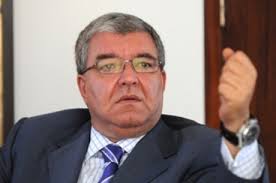 Lebanon Interior Minister Nouhad al-Mashnouq said that President Michel Aoun and Prime Minister Saad Hariri told the cabinet during Wednesday’s session that “the new electoral law will be finalized before the end of February.”
Lebanon Interior Minister Nouhad al-Mashnouq said that President Michel Aoun and Prime Minister Saad Hariri told the cabinet during Wednesday’s session that “the new electoral law will be finalized before the end of February.”
“There is no choice but to hold the parliamentary elections and I don’t have any doubt that they might not be held ,” Mashnouq added, during a meeting at the ministry with the ambassadors of the European Union and EU Member States.
Mashnouq reassured that “the situation is under control and there are no security concerns regarding the elections.”
Hezbollah, Future Movement , Free Patriotic Movement , AMAL Movement and the Lebanese Forces have been discussing several formats of a so-called hybrid electoral law that blends proportional representation with the winner-takes-all system, but the Democratic Gathering bloc led by MP Walid Jumblatt has totally rejected it warning that it would “marginalize” the minority Druze community.
Jumblatt has been calling for the implementation of the Taef Agreement and slammed threats ( by Aoun) about vacuum at the parliament as “unconstitutional.”
“Enough putting election draft laws that only divide instead of unite, and violate the constitution,” said Jumblatt in a tweet last Tuesday.
“Implement the Taef,” he said, voicing calls upon political parties to endorse a law for the upcoming parliamentary polls in conformity with the 1989 Taef Accord.
Jumblatt is backed by former presidential candidate Suleiman Franjieh who called the hybrid law too complicated.
Following the meeting with a Democratic Gathering delegation on Thursday he criticized the hybrid electoral law that has been discussed and accused the parties behind it of trying to eliminate the PSP and “marginalize” the minority Druze community.
Franjieh also lashed out at President Aoun without naming him, he said: “A political party came into power under the banner of empowering itself at the expense of others.”
He said he supports electoral laws that provide just representation for all political parties without excluding any.
“We simply support any just law, not complicated laws similar to the one suggested recently,” Franjieh told reporters, referring to the hybrid law proposed lately by the main political parties.
Franjieh’s remarks prompted Aoun’s son-in-law FM Gebran Bassil to say:
“I realize that some cannot understand figures. Let them find someone among them who does, so he would explain the suggestions we made.”
Meanwhile Hezbollah’s parliamentary bloc reiterated last Thursday its call for an electoral law fully based on the proportional representation system.
The Iranian-backed Hezbollah has repeatedly called for an electoral law fully based on proportional representation but other political parties, especially the Future Movement, have rejected the proposal and argued that the party’s controversial arsenal of arms would prevent serious competition in regions where the Iran-backed party has clout.In 2013 Lebanese Forces and The Future Movement backed by the PSP agreed on a hybrid electoral law which calls for 54% of the MPs to be elected under the majoritarian winner-takes-all system and 46 % under the proportional representation system. This draft law was rejected by the Hezbollah-led March 8 opposition.
Also in 2013 Future Movement leader PM Saad Hariri rejected the electoral law that is based on proportional representation because there will be competition in some regions, but there cannot be any competition in other regions, because of the presence of Hezbollah weapons in them.
Hariri was referring to the 2009 election in the areas dominated by Hezbollah. According to the reports that surfaced back then Hezbollah gunmen prevented their rivals from voting and the results of the election showed it. On the other hand in the March 14 dominated areas several Hezbollah backed candidates won the election that was based on winner-takes- all system . In a proportional representation system Hezbollah will be able to gain more seats in the March 14 dominated areas but will not lose any seats in its dominated areas as long as it is allowed to keep its arms and use them internally for political gain .
The country has not voted for a parliament since 2009, with the legislature instead twice extending its own mandate.
The 2009 polls were held under an amended version of the 1960 electoral law and the next elections are scheduled for May 2017.

Leave a Reply
You must be logged in to post a comment.